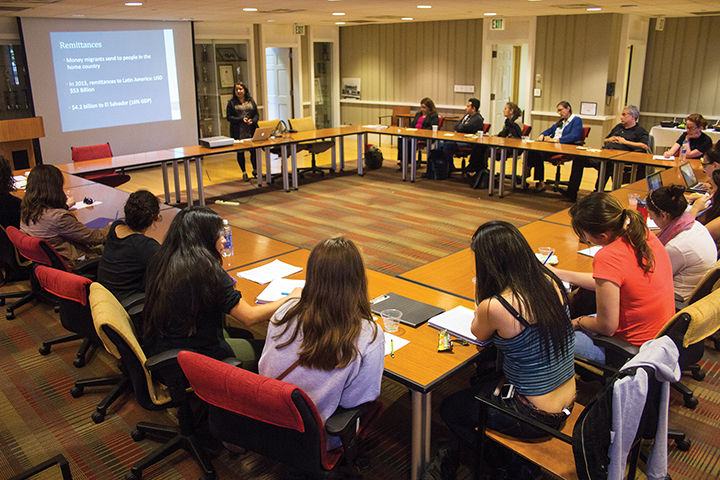
UCLA Professor Leisy Abrego discusses the issues and misconceptions around immigration from hispanic countries into the United States.
Immigration researcher and UCLA professor Leisy Abrego discussed the family dynamics of El Salvadorean migration and the recent influx of undocumented youth into the United States during a presentation in Marie Mount Hall on Monday night.
“People talk about migration as being a family affair,” Abrego said. “Whether it’s because you’re leaving to provide for your family, you’re leaving to reunite with your family, you’re trying to move your family so kids can have a better education. The idea of providing for your family is often at the center of reasons for migration.”
Abrego said she spoke with 130 Salvadorean parents and children, many of whom had been separated because of migration, as research for her book “Sacrificing Families: Navigating Laws, Labor and Love Across Borders.” Abrego shared some of their stories and talked about how it is difficult to keep her emotional reactions separate from her sociological analysis.
The topic was a familiar one for some students in the audience. Senior José Granados grew up in El Salvador with his mother and brother, but when he was 8 years old, he said his mother moved to the United States to create a better life.
While he was resentful at first, Granados said he came to understand the decision after his mother got him and his brother visas after three years of working three different jobs in America.
“I saw, in a way, the sacrifice she was doing because she wanted to apply for a Visa and unify with us later,” said the Spanish literatures and cultures major. “If my mom never had three jobs, never applied for a visa, maybe I would have been one of those kids [crossing the border illegally]. Maybe I would have stayed in El Salvador and joined a gang.”
In fiscal year 2014, 66,127 unaccompanied alien children were apprehended at the U.S.’s southwestern border, compared with 35,209 in the previous year, according to U.S. Customs and Border Protection.
Salvadoran politician Juan Manuel de Jésus Flores Cornejo also attended the discussion. He said the United States needs to be more accepting of these immigrants.
“Migrants are fundamental for the economy of this country. These migrants do the hard work and labor that many Americans do not want to do,” Flores Cornejo said with Granados translating. “That’s why it’s essential to have comprehensive immigration reforms that help the migrants not be in fear.”
The discussion was sponsored by the Center for the History of the New America, the Spanish and Portuguese languages department and the languages, literatures and cultures school. It is the first of a series of events centered around the immigration that will occur in the coming weeks.
Latino students will hold a vigil Sept. 29 outside the White House. Dr. Ana Patricia Rodriguez, a professor in the Spanish and Portuguese languages department who organized the events, said the vigil is intended to “bring to the attention of the administration the necessity of immigration reform and action to ameliorate the situation with child migrants.”
There will be a Sept. 30 screening of the documentary “Which Way Home,” about child immigrants. There also will be an Oct. 23 symposium with government and embassy officials talking about immigration.



